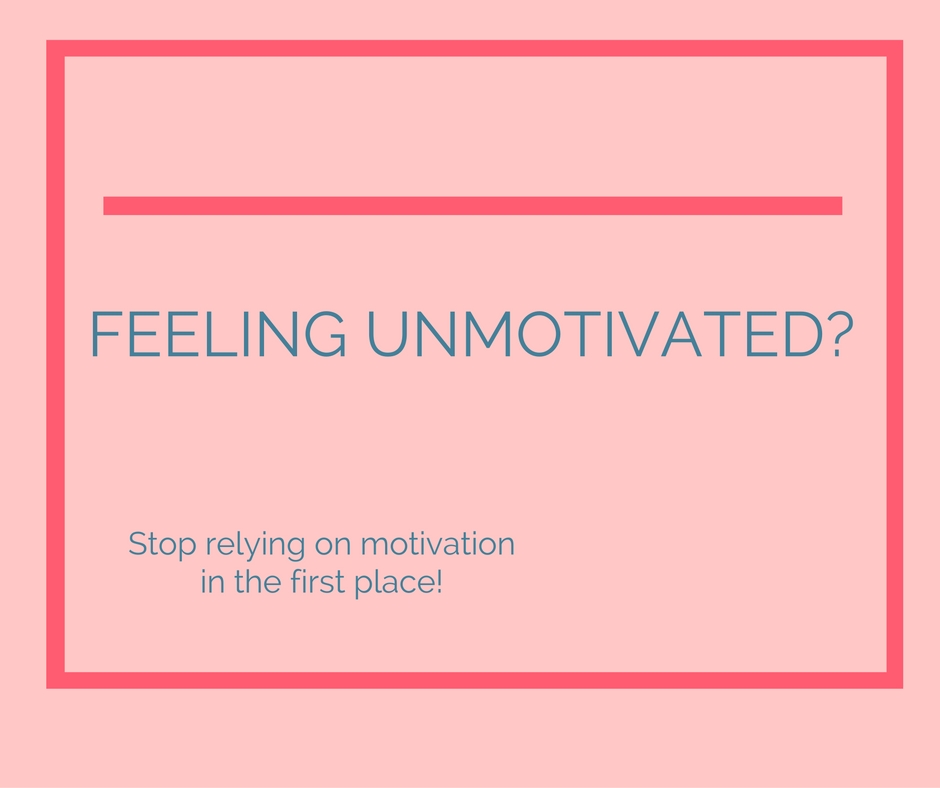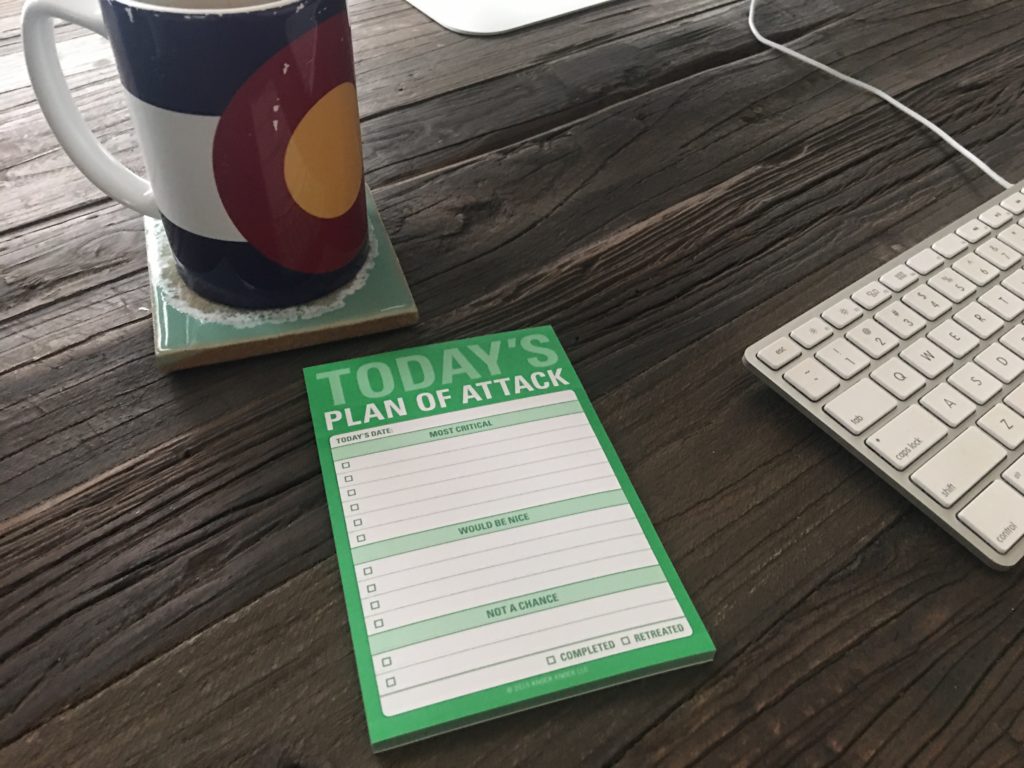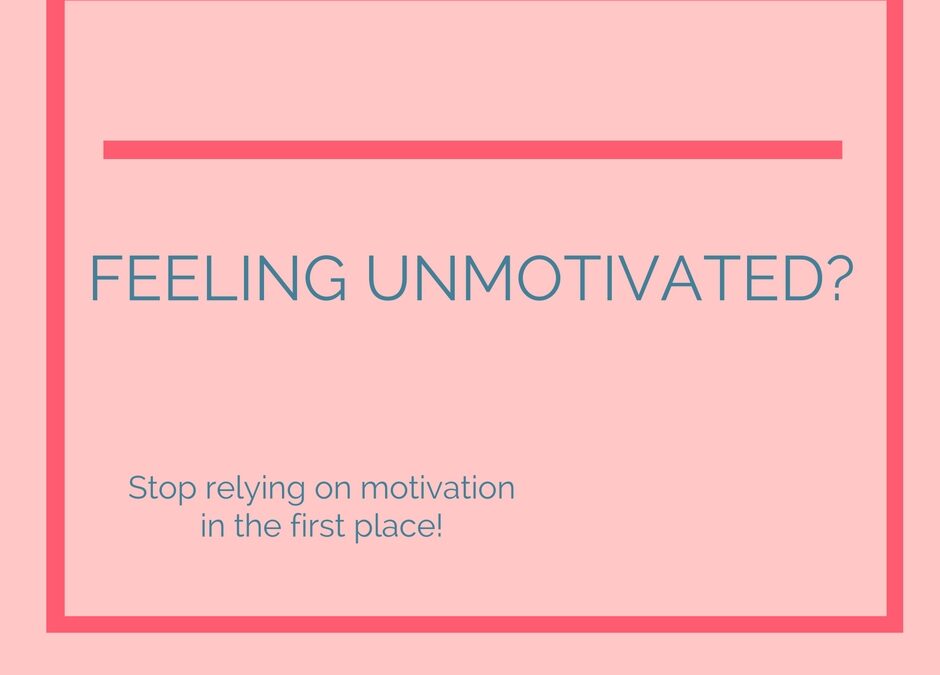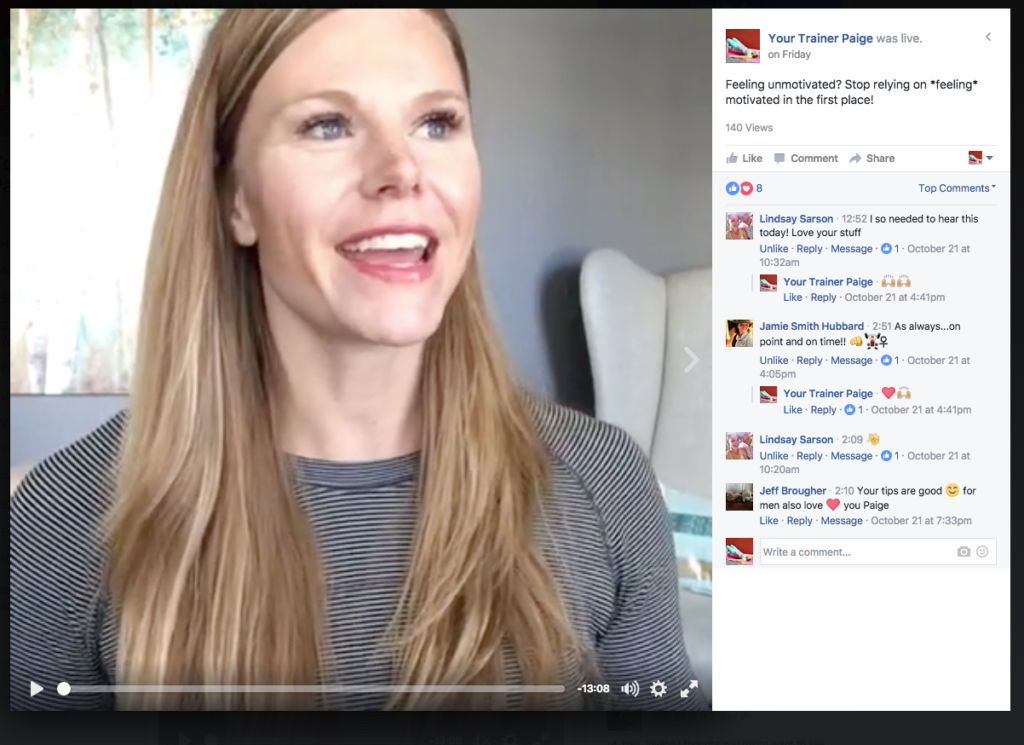Some thoughts and discussions from me.

Feeling unmotivated lately?
Have you ever found yourself super excited to take on a goal of yours – running out to prepare yourself and arm yourself with everything you’ll need to be successful? You buy a few things to help you out, sign up with a coach or a program to guide you and keep you accountable, and get a GOOD start going for the first few weeks…only to eventually wane and drift off after week 4?
Or, maybe every year toward the end of October, you find yourself just not placing as much vigor and excitement around your goals?
First, you are NOT alone. And secondly, I have a few tips that might help a sister out.
In Friday’s Facebook Live broadcast, and in the video below, I talk about the following:
- what happens when we become motivated and excited
- why sometimes that motivation leaves us
- how not to rely on motivation in the first place
- what to do instead
Feeling Unmotivated Lately? Stop Relying on Feeling Motivated from the start
So the first thing you might have noticed about the title of this blog post is “Stop relying on feeling motivated!”
Often times, when you decide to go after a goal, you’re super motivated — your willpower is high, your excitement level is high.
Maybe you signed up with a trainer, or signed up for a program, or wrote out your goals, and you are like, “Yeah, I’m gonna crush ’em!” And in that moment, you ARE going to crush them! You are dedicated, you are motivated.
But that motivation is inevitably going to start to wane, it’s going to decrease a bit– because motivation isn’t linear. If you just rely on that motivated feeling ALONE, it’s not going to cut it.
If we rely on a feeling, that feeling’s going to go away, and when the feeling goes away, so will the behaviors and actions that lead to the results we want.
So how do we take our motivation to take on goals and turn it into lasting results?
#1. Remembering your why
Remembering why you got excited about those goals in the first place.
Remembering WHY you decided to change your behaviors.
When we first sign up with a trainer, or decide to change our nutrition, we’re really excited about it, and that “feeling” is there. Our “why” is clear in our mind, we know exactly why we’re doing what we’re doing. In that moment, I want you to write it down. Write it down on multiple pieces of paper, on a white board, and keep it at the forefront of your memory.
In my office, I have a white board up on my shelf, and on it I have my mission statement for why I’m doing what I’m doing so I can walk in my office and be reminded that I’m helping women reach their goals and get the results they want without sacrificing their happiness. That’s in the forefront of my mind every single day.
So write down your why, and keep it front and center. That way, when your excitement and motivation dip, like they inevitably will do, you’ll have that why right there in front of you, and you can say to yourself, “Oh yeah, I’m doing this so I can keep up with my kids, because I want to toss my two-year-old up into the air without injuring my back, I want to fit back in those jeans that I did 3 years ago, etc.” Whatever your why is, keep it at the forefront of your memory.
#2. Build your self-discipline
Even more important that remembering your why is building some discipline.
Self-discipline is such a crucial practice to build in order to continue those behaviors that you know you need to do in order to reach your goals.
I was speaking with a fitness business mentorship clients of mine, and she was saying how her clients and audience ask her how she gets up in the morning and works out, and she said “Well, I just do it!” That’s self-discipline. If your answer is, “I just do it!”, then you’re self-disciplined.
And it’s not as if you’re born with this trait, or that it’s inherently in you. Discipline is a practice that you can work on in your life in order to be more successful in your goals.
Sooo, you’re likely asking: How can I build self-discipline?!
1. Here it is again — remembering your why!
It’s going to be incredibly hard to do something if you don’t know why you’re doing it. When you set a goal, it’s not going to be easy to make it, or else it wouldn’t be a goal. Knowing what you’re doing and why you’re doing it is crucial.
2. Write down the changes that need to happen.
Let’s say your goal is that you want to lean out and drop a few pounds by Thanksgiving. What needs to happen? Write down specific behavior changes that need to happen, or work with a trainer or coach who can help you outline specific changes that need to happen and make them as easy as possible for yourself. You don’t want to make it harder than it needs to be, because it’s already going to be tough.
Let’s also talk about willpower here. Our willpower gets drained as the day goes on, and things that drain our willpower don’t only include steps we need to be doing to meet our goals, but also things like getting stuck in traffic, or a hard decision that you need to make at work, or even deciding what to eat for lunch. Streamline as much as possible in order to keep your willpower high.
This is where writing out a daily to-do list becomes a major help for me. Actually, I write out my to-do list for the next day at the end of my current work day. That way I know exactly what I need to do to stay on track with my goals, instead of spending precious mental energy trying to decide what to do next.

In order to make changes, find your routine. Routine is huge for me personally, and finding your routine will help make those changes be as seamless as possible.
3. Find inspiration
Who is already doing what you want to be doing? Who has already made it where you want to make it?
I want this person, thing, or concept to make you feel good about yourself — not make you doubt yourself.
For example, the “fitspiration” movement on social media. If seeing a girl who has your “goal” body actually makes you feel icky and crappy and not good — she’s not your inspiration. In fact, stop following her.
Find someone or something who makes you want to do better and makes you want to do the steps that need to be done; who makes you feel good and inspired. This can be a person, or this could even be a mantra or affirmation. This could be a previous version of you — not that we should continue to relive the past — but find that inspiration that makes you feel good about yourself while also wanting to better yourself.
4. Figure out the road blocks, because they will happen.
Make sure you call out possible stumbling blocks.
If we’re talking about leaning out, maybe you have a Halloween party and you know it’s going to revolve around lots of food and drinks, and it’s going to be the first week you decided to start. Maybe look at that and say to yourself, “Okay, I’m going to pick a few things I’m going to really enjoy and not deprive myself, but I’m not going to go crazy.” Or maybe since it’s your first week, you say, “I’m going to enjoy the company, rather than the food and the drink, and that’s how I’m going to really enjoy this event.”
So pick those stumbling blocks out, make sure that you know they’re going to happen, and come up with a plan for when they do happen.
5. Accountability
Whether it’s in the form of a trainer or coach, a training buddy, or a group of accountability buddies, accountability is crucial. In fact, I always ensure that, in my online boot camps, my accountability groups have a very active community, complete with check-ins and required participation. Yes, I’m there to coach them and keep them accountable as their trainer, but that extra layer of having a group to be accountable to has proven time and time again to sky rocket results.
if you have that accountability, you will be that much more likely to accomplish your goals.
For example, I was on a phone call with an online client this week, and we were talking about ways to utilize the accountability through the programming. We came up with a few different ways, and that’s going to help her with her nutrition moving forward.
So, write down those behavior goals and focus on those behaviors. Don’t focus so much on the outcome, because that will lead to you just getting burned out. If I only focused on my end goal, I would get burned out and let down. If you focus on the daily behavior goals, you’ll place more focus on making those baby steps to get yourself where you need to be.
Bottom line: don’t rely on motivation anymore to “feel motivated.” Instead, remember your “why” and build that self-discipline.
This week my Lean Body Lifting groups are focusing on building discipline by streamlining their nutrition, and I truly could not be more proud of them. It’s not the easiest time of year to crush goals, but these ladies are getting after it and seeing great results after only one and three weeks. Super proud of them!!
So tell me: how do you keep yourself on the fast (or not so fast — that’s fine, too:) ) track toward progress and results after setting a goal?



I literally just got off the phone with my friend talking about how I am unmotivated in the gym and need to try something new haha. Thanks for this article. 🙂
Trying something new always helps, too!!
Ok I am SO unmotivated because I am pregnant and super sick this time! I can’t even step into the gym because of the smells…no joke! But I try to stay motivated by enjoying the outdoors and walking in the mornings! Now I just wish I felt like cooking…. 😉
Oh, man! I feel for ya, Laura! Hopefully you’re feeling better soon XO
These are such great tips! We deal with this a lot in our home, “the need to be motivated”, but I believe sometimes you just have to figure out the end game and push forward with your goals.